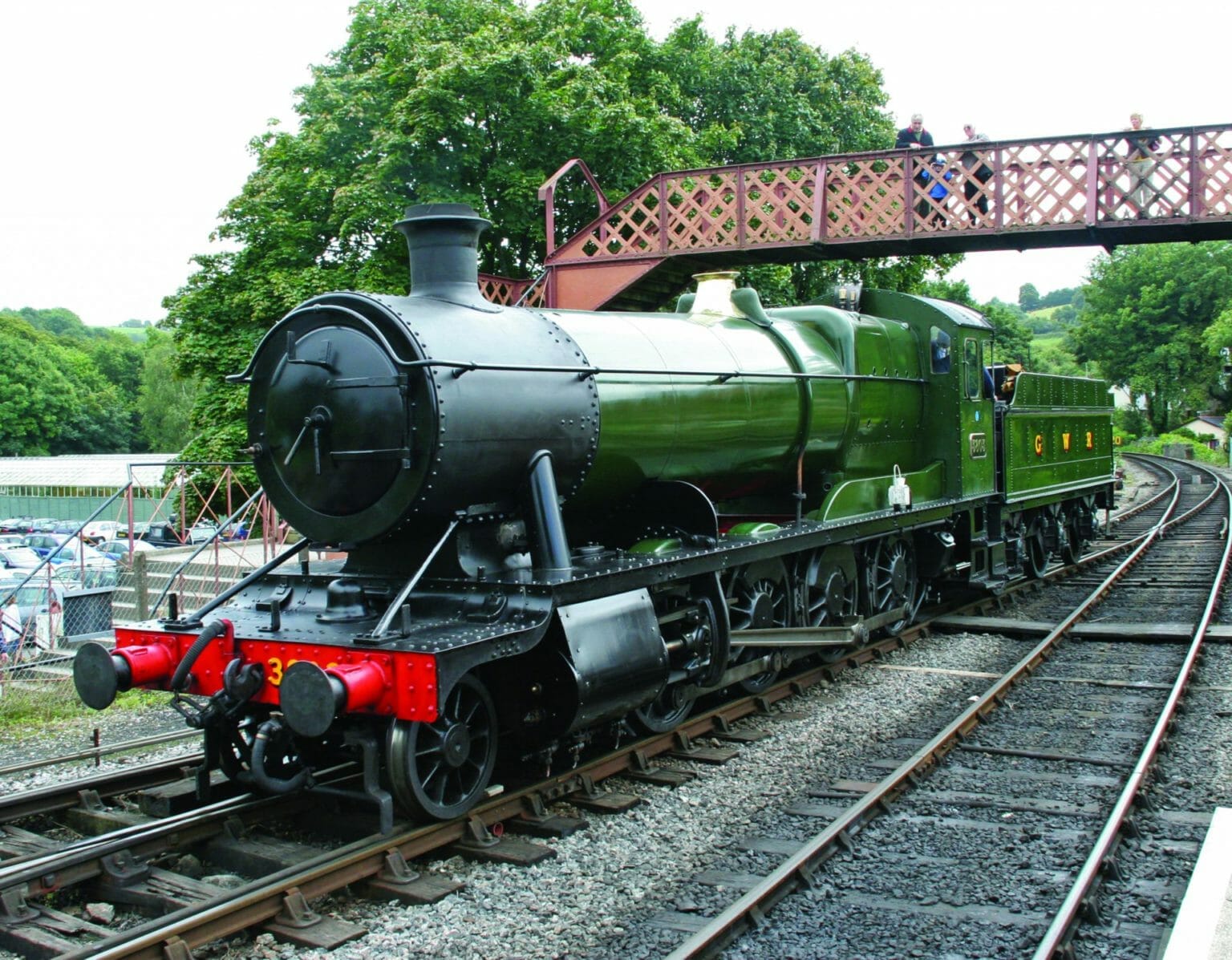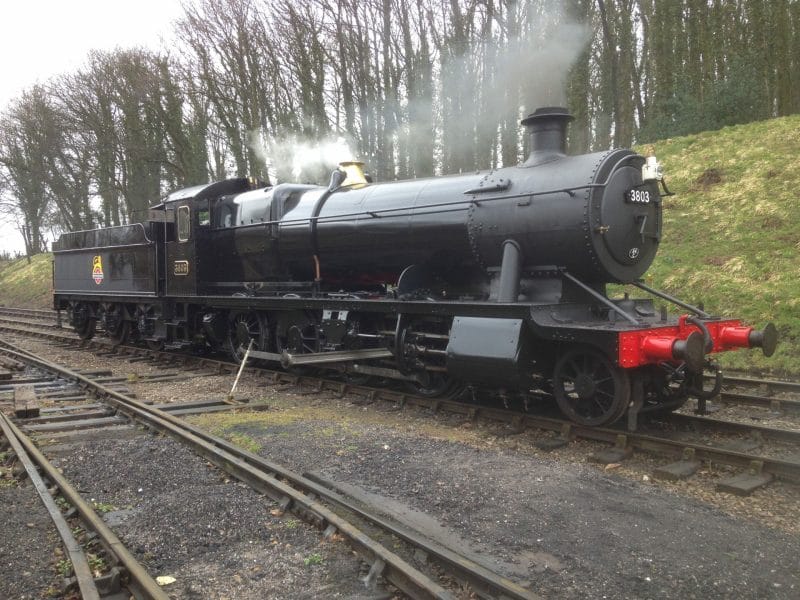1939 Swindon built ex-GWR 2884 class 2-8-0 no. 3803 has been sold by the South Devon Railway (SDR) for an undisclosed sum to the Paignton-based Dartmouth Steam Railway and Riverboat Company.
The sale also includes the frames of 1918-built 28xx class 2-8-0 no. 2873. The SDR is using the proceeds from the sale to invest in restoration and overhaul projects on the railway’s home fleet.
C. B. Collett’s 2884 class is a development of G. J. Churchward’s highly capable 28xx class of heavy freight locomotives of 1903 which were the first engines to pull 2000 tons, a remarkable feat for the time. 3803 spent most of her time working round the GWR system on heavy freight trains, being shedded first at Tyseley, then Banbury, Southall and Cardiff Canton, before finishing her days at Severn Tunnel Junction.
After a service life covering 726,770 miles, she was withdrawn in July 1963 and sent to Woodham’s scrapyard in Barry. Rescued in November 1983, she came to Buckfastleigh where, after a lengthy overhaul, she returned to steam in 2005.

Commenting, the SDR’s general manager, Ernest Elsworth-Wilson, said: “This is very much the right thing for us to do. When 3803 was bought from Barry scrapyard, she was destined for service on the steeply graded Paignton to Kingswear line, when both lines were under the same Dart Valley Railway ownership. So, she is going to the line she was originally intend for, which is very good news indeed. In the meantime, we have earmarked the proceeds from her sale for a number of projects that will see more of our home fleet returned to steam.”

3803 has had relatively little use on the South Devon Railway but spent a number of seasons on hire to the Shakerstone Railway.
John Jones, managing director of the Dartmouth Steam Railway, said: “We are delighted to have secured 3803 which we are looking forward to returning to steam in the not too distant future. It has been well looked after and is ideally suited to our line: it will make light work of even our heaviest trains. Given that it was purchased with the aim of working here, to a great extent the locomotive is finally coming home!”
The SDR’s former general manager, Richard Elliott, who was instrumental in the purchase of 3803 and 2873 from Barry scrapyard, added: “3803 will now get to work on the line for which she was intended, and our members will be able to enjoy seeing her working hard for her living. We’re pleased that the funds realised will be applied to important capital projects on the SDR.”
3803. A member of the 2884 class, 2-8-0 no 3803 was completed at the Great Western Railway’s Swindon factory in January 1939 at a cost of £4285, including £1147 for the boiler.
For book-keeping purposes, the cost of her tender is recorded as being £1884, but she was coupled with 1923-built tender no 2218 when completed, which would have cost around £1000 when new. The GWR at the time was hoping for a large share in a probable Government grant for building new engines for the war effort at the outbreak of the war, which had formerly been intended for the GPO, and this is thought to have accounted for the unusual price of the tender.
C. B. Collett’s 2884 class is a development of G. J. Churchward’s highly capable 28xx class of heavy freight locomotives of 1903 which were the first engines to pull 2000 tons, a remarkable feat for the time.
3803 spent most of her time working round the GWR system on heavy freight trains, being shedded first at Tyseley, then Banbury, Southall and Cardiff Canton, before finishing her days at Severn Tunnel Junction.
After a service life covering 726,770 miles, she was withdrawn in July 1963 and sent to Woodham’s scrapyard in Barry. Rescued in November 1983, she came to Buckfastleigh where, after a lengthy overhaul, she returned to steam in 2005.
2873. Built in 1918 to C. B. Collett’s design, 2873 is one of the successful 28xx class of heavy freight locomotives introduced in 1903. 2873 is an original version of Churchward’s 2-8-0 with inside steam pipes rather than the C.B. Collet 2884 version of which 3803 is an example.
The engine was purchased as a source of spares from Woodham Bros’ scrapyard in South Wales.
| Cookie | Duration | Description |
|---|---|---|
| _EDGE_S | session | Bing sets this cookie to display map content using Bing Maps. |
| _EDGE_V | 1 year 24 days | Bing sets this cookie to display map content using Bing Maps. |
| Cookie | Duration | Description |
|---|---|---|
| _ga_* | 1 year 1 month 4 days | Google Analytics sets this cookie to store and count page views. |
| CONSENT | 2 years | YouTube sets this cookie via embedded YouTube videos and registers anonymous statistical data. |
| MUIDB | 1 year 24 days | Bing sets this cookie to determine how the user uses the website and any advertising that the end user may have seen before visiting the said website. |
| Cookie | Duration | Description |
|---|---|---|
| MUID | 1 year 24 days | Bing sets this cookie to recognise unique web browsers visiting Microsoft sites. This cookie is used for advertising, site analytics, and other operations. |
| Cookie | Duration | Description |
|---|---|---|
| ppc_last_visited_page | 1 hour | Description is currently not available. |
| SRCHHPGUSR | 1 year 24 days | No description available. |
| VISITOR_PRIVACY_METADATA | 5 months 27 days | Description is currently not available. |
| zoom | never | No description available. |